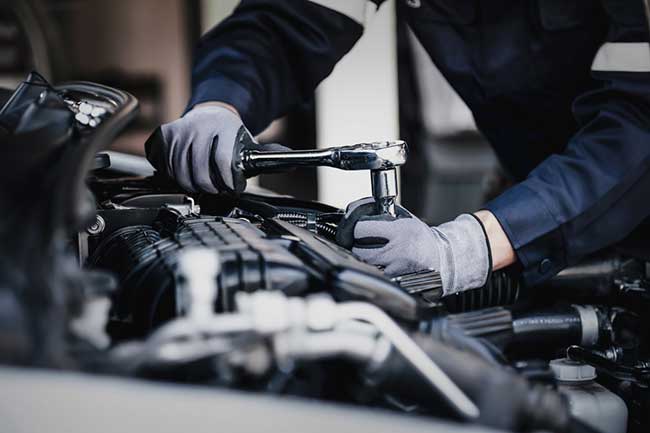All Categories
Featured
Your automobile's engine is a complicated system that depends on many interconnected components to function appropriately. Among the most crucial components that makes sure every little thing runs smoothly is the timing belt. Typically ignored, the timing belt plays a crucial role in maintaining your engine synchronized and operating at peak efficiency. Disregarding its upkeep or replacement can cause significant, costly damage to your engine. In this short article, we'll discover the relevance of timing belt substitute and why it's necessary to your engine's durability.
What Is a Timing Belt and Just How Does It Function? The timing belt is a rubber or reinforced composite belt that links the crankshaft to the camshaft in your engine. These two parts need to run in sync for the engine's shutoffs to close and open at the correct times during the burning cycle. The timing belt regulates this synchronization, making certain that the pistons and valves do not collide.
![]()
As your engine runs, the timing belt consistently transfers to keep these parts aligned. Gradually, the belt undertakes damage from engine, heat, and rubbing resonances. If it damages or comes to be loosened, the crankshaft and camshaft will no more be synchronized, causing engine misfires, loss of power, or, in the worst situation, severe engine damage.
Why Timing Belt Replacement Is Critical. Prevents Serious Engine Damages: If the timing belt breaks while the engine is running, the pistons can ram the valves, triggering curved valves, harmed pistons, or perhaps a fractured engine block. This kind of damages often needs costly and extensive repairs or a whole engine substitute. Changing the timing belt before it falls short is a easy and economical method to prevent such catastrophic effects.
![]()
Ensures Smooth Engine Procedure: A well-kept timing belt aids keep your engine running smoothly by maintaining the proper synchronization in between the crankshaft and camshaft. When the timing belt is used out or extended, the timing of the engine's valves might be off, creating engine misfires, harsh idling, or delaying. Replacing the timing belt at the advised period makes certain that the engine operates as it was developed to, optimizing performance and effectiveness.
Saves You Money: Although changing the timing belt might look like a considerable ahead of time cost, it's far extra economical than the cost of fixing or changing a harmed engine. The labor associated with changing the timing belt is much less pricey than fixing engine parts that are harmed because of a broken belt. Normal timing belt substitute can save you thousands of dollars in the long run by protecting against engine failure and pricey repair work.
Prevents Unanticipated Malfunctions: If your timing belt breaks suddenly while you're driving, it can leave you stranded and call for costly towing. In the worst instances, it can trigger a complete engine failure that renders your vehicle inoperable. By replacing the timing belt according to the maker's standards, you lower the risk of sudden break downs and guarantee your vehicle remains trusted throughout day-to-day driving and long trips.
When Should You Change Your Timing Belt? The timing belt does not last permanently, and its replacement timeline can differ depending upon the make and design of your lorry. Many producers recommend replacing the timing belt every 60,000 to 100,000 miles. However, it is necessary to consult your car's proprietor's handbook for specific standards, as some engines might call for earlier or later substitutes.
If you're uncertain regarding the problem of your timing belt, indicators that it may need replacing consist of unusual engine noise (such as ticking or slapping audios), trouble starting the engine, or inadequate engine performance. If needed., a specialist technician can evaluate the timing belt for wear and tear and replace it.
Final thought. The timing belt is a vital part of your car's engine, and its proper maintenance can save you from pricey fixings and engine damages. Frequently changing the timing belt at the maker's recommended intervals assists make sure smooth engine operation, avoids unexpected break downs, and ultimately lengthens the life of your engine. Do not disregard this vital upkeep task-- by remaining on top of timing belt replacement, you're purchasing the lasting health and wellness of your lorry.
What Is a Timing Belt and Just How Does It Function? The timing belt is a rubber or reinforced composite belt that links the crankshaft to the camshaft in your engine. These two parts need to run in sync for the engine's shutoffs to close and open at the correct times during the burning cycle. The timing belt regulates this synchronization, making certain that the pistons and valves do not collide.

As your engine runs, the timing belt consistently transfers to keep these parts aligned. Gradually, the belt undertakes damage from engine, heat, and rubbing resonances. If it damages or comes to be loosened, the crankshaft and camshaft will no more be synchronized, causing engine misfires, loss of power, or, in the worst situation, severe engine damage.
Why Timing Belt Replacement Is Critical. Prevents Serious Engine Damages: If the timing belt breaks while the engine is running, the pistons can ram the valves, triggering curved valves, harmed pistons, or perhaps a fractured engine block. This kind of damages often needs costly and extensive repairs or a whole engine substitute. Changing the timing belt before it falls short is a easy and economical method to prevent such catastrophic effects.

Ensures Smooth Engine Procedure: A well-kept timing belt aids keep your engine running smoothly by maintaining the proper synchronization in between the crankshaft and camshaft. When the timing belt is used out or extended, the timing of the engine's valves might be off, creating engine misfires, harsh idling, or delaying. Replacing the timing belt at the advised period makes certain that the engine operates as it was developed to, optimizing performance and effectiveness.
Saves You Money: Although changing the timing belt might look like a considerable ahead of time cost, it's far extra economical than the cost of fixing or changing a harmed engine. The labor associated with changing the timing belt is much less pricey than fixing engine parts that are harmed because of a broken belt. Normal timing belt substitute can save you thousands of dollars in the long run by protecting against engine failure and pricey repair work.
Prevents Unanticipated Malfunctions: If your timing belt breaks suddenly while you're driving, it can leave you stranded and call for costly towing. In the worst instances, it can trigger a complete engine failure that renders your vehicle inoperable. By replacing the timing belt according to the maker's standards, you lower the risk of sudden break downs and guarantee your vehicle remains trusted throughout day-to-day driving and long trips.
When Should You Change Your Timing Belt? The timing belt does not last permanently, and its replacement timeline can differ depending upon the make and design of your lorry. Many producers recommend replacing the timing belt every 60,000 to 100,000 miles. However, it is necessary to consult your car's proprietor's handbook for specific standards, as some engines might call for earlier or later substitutes.
If you're uncertain regarding the problem of your timing belt, indicators that it may need replacing consist of unusual engine noise (such as ticking or slapping audios), trouble starting the engine, or inadequate engine performance. If needed., a specialist technician can evaluate the timing belt for wear and tear and replace it.
Final thought. The timing belt is a vital part of your car's engine, and its proper maintenance can save you from pricey fixings and engine damages. Frequently changing the timing belt at the maker's recommended intervals assists make sure smooth engine operation, avoids unexpected break downs, and ultimately lengthens the life of your engine. Do not disregard this vital upkeep task-- by remaining on top of timing belt replacement, you're purchasing the lasting health and wellness of your lorry.
Latest Posts
Get Huge Savings with Montclare Auto Repair Service Promotions - Grab Yours Today!
Published Apr 20, 25
2 min read
Discover the Skilled Technicians Behind Montclare Auto Repair - Here to Serve You
Published Apr 20, 25
2 min read
Open Greater Incomes with WyHy Cash Market Accounts
Published Apr 20, 25
1 min read
More
Latest Posts
Get Huge Savings with Montclare Auto Repair Service Promotions - Grab Yours Today!
Published Apr 20, 25
2 min read
Discover the Skilled Technicians Behind Montclare Auto Repair - Here to Serve You
Published Apr 20, 25
2 min read
Open Greater Incomes with WyHy Cash Market Accounts
Published Apr 20, 25
1 min read